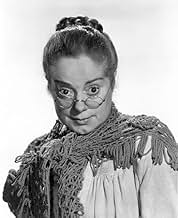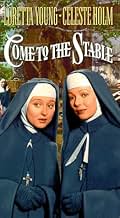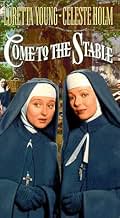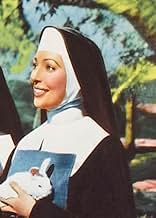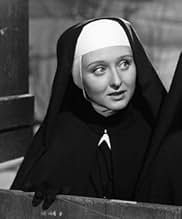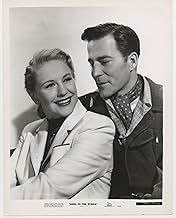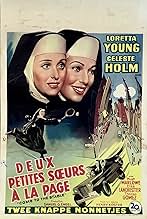IMDb RATING
7.1/10
1.7K
YOUR RATING
Two nuns arrive unannounced in the small New England town of Bethlehem, where they recruit various townspeople to help them build a children's hospital.Two nuns arrive unannounced in the small New England town of Bethlehem, where they recruit various townspeople to help them build a children's hospital.Two nuns arrive unannounced in the small New England town of Bethlehem, where they recruit various townspeople to help them build a children's hospital.
- Director
- Writers
- Stars
- Nominated for 7 Oscars
- 5 wins & 9 nominations total
Walter Baldwin
- Claude Jarman - Realtor
- (uncredited)
Pati Behrs
- Nun
- (uncredited)
John Bleifer
- Rosey - Rossi's Goon
- (uncredited)
Nan Boardman
- Nun
- (uncredited)
Wally Brown
- Howard Sheldon - Bob's Agent
- (uncredited)
Russ Clark
- Policeman
- (uncredited)
Louise Colombet
- Nun
- (uncredited)
Teddy Driver
- Cherub
- (uncredited)
- Director
- Writers
- All cast & crew
- Production, box office & more at IMDbPro
Featured reviews
Charming old-fashioned dramedy about a pair of nuns (Loretta Young, Celeste Holm) who travel from France to the small New England town of Bethlehem with the intention of building a children's hospital there. They meet various characters while they try to raise the necessary funds for the construction of the hospital. A simple but heartwarming story, suitable for Christmas viewing but good to watch any time of the year. Loretta Young and Celeste Holm are both perfect for their roles. The always enjoyable Elsa Lanchester is the movie's scene stealer as a quirky artist who takes the nuns in. The rest of the cast includes Hugh Marlowe, Thomas Gomez, Regis Toomey, Dorothy Parker, Mike Mazurki, and Dooley Wilson. It's a beautiful-looking film whose sets and cinematography both received Oscar nominations (it received seven Oscar nods overall). It features the nice song "Through a Long and Sleepless Night," sung by the obviously dubbed Hugh Marlowe and Dorothy Parker. Dripping with sentiment, humor, and good will, it's a lovely film. 'The kind they don't make anymore,' as they say.
10rcl1316
"Come to the Stable" is a beautiful, sentimental movie, in the vein of "Bells of St. Marys" and "Going My Way." I saw it many years ago before buying the video and seeing it again. Loretta Young, unquestionably one of the great actresses of all time, is outstanding as a dedicated nun. So is Celeste Holm. It is easy to see why they were nominated for oscars. The picture itself received (I believe) six nominations.
The picture has you pulling for these dedicated nuns to accomplish their task. As with movies of this era, of course they do.
It is well worth watching.
The picture has you pulling for these dedicated nuns to accomplish their task. As with movies of this era, of course they do.
It is well worth watching.
Come to the Stable (1949)
*** (out of 4)
Excellent performances and a touching story highlight this comedy/drama about a pair of nuns (Loretta Young, Celeste Holm) who travel from France to New England where they plan on building a children's hospital. Without any type of funds, the nuns try to gather enough money for their dream to come true but they're going to have to depend on some characters who aren't all that thrilled about the hospital. This film was nominated for seven Oscars but it seems to have been forgotten, which is a real shame because this is a pretty touching little gem that works on many levels. What really stands out are the terrific performances with Young and Holm both turning in strong work. There wasn't a single second that I ever looked at their characters and saw actors because the two were so good that you'll have no trouble believing that they are nuns. They're surrounding by some fine actors including Hugh Marlowe as a neighbor who doesn't want to church built. Elsa Lancaster plays an elderly, lonely woman who first takes the nuns in and Thomas Gomez is terrific as a gambler who owns the property where the sisters are wanting to build the hospital. The movie tries walking a fine line between laughs and drama and for the most part it works. I think there are a few bits that push too hard for comedy and you'll see one such scene early one when the "joke" about the nuns driving too fast is played to the extreme. The main reason this movie works is due to its more dramatic and religious moments. The film is never preachy nor does it try to convert people; instead it just makes you feel good. The sequence where the nuns go to the gambler to try and get him to give away the land ends is a very dramatic sequence that I won't ruin but it's incredibly touching. Another terrific scene is when the nuns try to get the local Bishop to buy into their ideas even though it seems impossible that they'll be able to pull them off. Apparently this drama was so successful when first released that a sequel was planned but never produced. It's easy to see why this movie would bring a crowd in but it deserves to be better known today.
*** (out of 4)
Excellent performances and a touching story highlight this comedy/drama about a pair of nuns (Loretta Young, Celeste Holm) who travel from France to New England where they plan on building a children's hospital. Without any type of funds, the nuns try to gather enough money for their dream to come true but they're going to have to depend on some characters who aren't all that thrilled about the hospital. This film was nominated for seven Oscars but it seems to have been forgotten, which is a real shame because this is a pretty touching little gem that works on many levels. What really stands out are the terrific performances with Young and Holm both turning in strong work. There wasn't a single second that I ever looked at their characters and saw actors because the two were so good that you'll have no trouble believing that they are nuns. They're surrounding by some fine actors including Hugh Marlowe as a neighbor who doesn't want to church built. Elsa Lancaster plays an elderly, lonely woman who first takes the nuns in and Thomas Gomez is terrific as a gambler who owns the property where the sisters are wanting to build the hospital. The movie tries walking a fine line between laughs and drama and for the most part it works. I think there are a few bits that push too hard for comedy and you'll see one such scene early one when the "joke" about the nuns driving too fast is played to the extreme. The main reason this movie works is due to its more dramatic and religious moments. The film is never preachy nor does it try to convert people; instead it just makes you feel good. The sequence where the nuns go to the gambler to try and get him to give away the land ends is a very dramatic sequence that I won't ruin but it's incredibly touching. Another terrific scene is when the nuns try to get the local Bishop to buy into their ideas even though it seems impossible that they'll be able to pull them off. Apparently this drama was so successful when first released that a sequel was planned but never produced. It's easy to see why this movie would bring a crowd in but it deserves to be better known today.
10crash5
For some reason we bought this movie years ago. Every time I started to watch it I fell asleep before the end. It sat in storage for years and I took it out last week and FINALLY watched it from beginning to end. What a surprise! It's a heartwarming movie. It's definetly a period film, but it's not corny. I think I like the respect that God gets in the storyline. A 10 out of 10, just because!!
I saw this charming, slickly produced film as a young parochial grammar school kid at a theater in downtown Boston (near where my family lived at the time) and remember being tremendously amused at the scene where the two sisters, played by Loretta and Celeste (saddled with having to approximate a French accent), blithely tore up a parking ticket, placed on the windshield of their borrowed open WW II-era Jeep, thinking it was just an advertisement. Sister Celeste tosses the pieces into the air as they drive off from in front of New York's St. Patrick Cathedral where they'd illegally parked. (I doubt that she felt obliged to confess that little venial sin, do you?) There's a lot more to be amused and entertained by, of course, and the behind-the-camera artisans, as well as the well-chosen actors, especially Hugh Marlowe and Elsa Lanchester as well as Misses Young and Holm, all contributed some very professional work. Henry Koster, the director, was an old hand at keeping a project such as this from slipping entirely into a bath of over-the-top sentimentality.
So much has changed since those somewhat more innocent times and a gentle story such as this, with two ladies encased in those heavy, enveloping habits (with only their perfectly made-up faces visible to the world, by the way), is almost inconceivable today. See it and be transported back to a time when goodness, sincerity, and religious beliefs that don't descend into fanaticism were the order of the day, at least in Hollywood movies aimed at the family trade.
One interesting little tidbit: in one scene Hugh Marlowe's character (a song writer) sings the Academy Award-nominated song, "Through a Long and Sleepless Night" (which didn't win - and you'll hear why), and his singing voice was dubbed by Ken Darby, who was chiefly responsible for directing most of the choral work in many of Twentieth's films for many years. I have a suspicion that Mr. Darby probably rejected quite a few male candidates who wanted to join the Fox studio's choir if they didn't sound any better than he did!
So much has changed since those somewhat more innocent times and a gentle story such as this, with two ladies encased in those heavy, enveloping habits (with only their perfectly made-up faces visible to the world, by the way), is almost inconceivable today. See it and be transported back to a time when goodness, sincerity, and religious beliefs that don't descend into fanaticism were the order of the day, at least in Hollywood movies aimed at the family trade.
One interesting little tidbit: in one scene Hugh Marlowe's character (a song writer) sings the Academy Award-nominated song, "Through a Long and Sleepless Night" (which didn't win - and you'll hear why), and his singing voice was dubbed by Ken Darby, who was chiefly responsible for directing most of the choral work in many of Twentieth's films for many years. I have a suspicion that Mr. Darby probably rejected quite a few male candidates who wanted to join the Fox studio's choir if they didn't sound any better than he did!
Did you know
- TriviaAccording to a TCM narrative, "Come to the Stable" is based on the founding of the Abbey of Regina Laudis in Bethlehem, Conn., which was founded in 1947 by Mother Benedict Duss, O.S.B. and Mother Mary Aline Trilles de Warren, O.S.B. of the Benedictine Abbey of Notre Dame de Jouarre in France. One-time Hollywood actress, Dolores Hart, entered the convent in 1963, later becoming Abbess. Partly because of her acting background, the abbey now sponsors annual summer theatre productions.
- GoofsWhen the nuns first leave the train station with Anthony in the jeep, it has chains on the rear wheels. When they arrive at Mrs. Potts' house, the chains are gone.
- Quotes
Sister Margaret: It isn't hard to relinquish a dream if it's God's will. Yes?
- ConnectionsFeatured in A Hollywood Christmas (1996)
- SoundtracksThrough a Long and Sleepless Night
Music by Alfred Newman
Lyrics by Mack Gordon
Performed by Dorothy Patrick (dubbed by Eileen Wilson) (uncredited) and by Hugh Marlowe (dubbed by Ken Darby) (uncredited)
- How long is Come to the Stable?Powered by Alexa
Details
- Release date
- Country of origin
- Languages
- Also known as
- Hablan las campanas
- Filming locations
- Production company
- See more company credits at IMDbPro
- Runtime
- 1h 34m(94 min)
- Color
- Aspect ratio
- 1.37 : 1
Contribute to this page
Suggest an edit or add missing content

